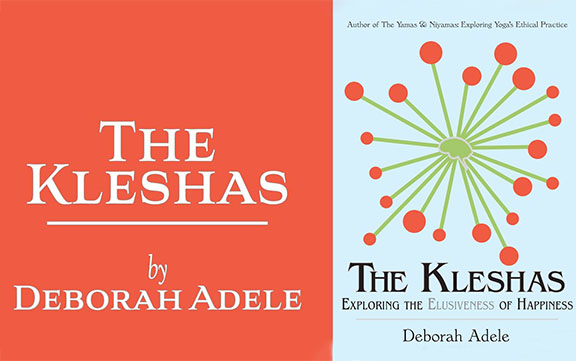
Photo: Deborah Adele’s The Kleshas.
The kleshas are Yoga’s framework for understanding the discord between our desires and our lived experience. Deborah Adele’s new book, The Kleshas: Exploring the Elusiveness of Happiness, lays open the insight and wisdom of the sage Patanjali, as described in the Yoga Sutras, in relatable, modern language. This is Yoga’s answer to managing the roaming tendencies of our minds, helping us create a mind we can live with. Integral Yoga Magazine is pleased to offer an excerpt from the book:
The kleshas form a narrative, the conditioning of thought and belief, that is invisible because it is taken as the norm. They limit our happiness, hijack our minds, and promote the very suffering we try so hard to prevent.
I don’t mean to be depressive and gloomy, but rather just the opposite. I relish getting at the problem because it gives understanding and guidance, and for me that produces hope. I like to know what is in the way, i.e., what is keeping me from experiencing the fullness of my capabilities. I want to bring the kleshas out into the open where they can be seen and examined.
The kleshas are: avidya (not knowing/ being ignorant of who we are), asmita (giving definition to who we think we are), raga (seeking to feel good), dvesha (seeking to avoid feeling bad), and abhinivesha (fearing death). Making visible what has been invisible is often painful, but is also freeing. Knowledge of something previously unknown opens the possibility of scrutiny and choice previously unavailable.
It is my hope that understanding our entanglement in the kleshas will act as inspiration and incentive to engage in a practice that unbinds our minds and opens us to more than we ever thought possible for ourselves and our world. It is also my hope that we will love ourselves enough to make this effort.
Seeing, as a critical factor in itself, is hard for most of our Western minds. We have been conditioned to fix, analyze, set goals, accomplish…and seeing doesn’t feel like we are doing much. Yet as we see, i.e., become aware of, what we have previously not noticed, we gain the power of choice and the desire to engage in a practice that will bring us freedom.
We can look at the mind, how the thinking mind works, and how the kleshas interfere with the innate peaceful state of the mind, causing a mind that is scattered, dull, and most often not under our control. The mind is the platform where the battle of bondage to the kleshas, or freedom from them, occurs.
Gaining knowledge of the kleshas and the role of the mind does not solve the problem of bondage; it helps us understand it. To free ourselves, we need to take action, to explore the process that liberates us from our misunderstanding and places us on the path to lasting happiness and fulfillment. What are the lived benefits of freedom on both a personal and collective level? What is on the “other side” of bondage? Reflecting on questions such as these helps us deepen the ways we understand the role of the kleshas and the importance of practice in one’s personal life, while taking us from conceptual knowledge into a lived experience.
About the Author:
 Deborah Adele holds master’s degrees in both Liberal Studies and Theology & Religious Studies. She carries Yoga certifications in Kundalini Yoga, Hatha Yoga, Yoga Therapy, and Meditation. In 2009 she published The Yamas & Niyamas: Exploring Yoga’s Ethical Practice, which has become an international best-seller and a modern classic. Teaching and reflection on the Yamas and Niyamas, led her to a deeper study of Yoga philosophy when she realized that the Yamas and Niyamas are the answer and she wondered, “What’s the question?” and, “What’s the problem?” She came to understand that the kleshas are the problem; leading to the writing of her new book, The Kleshas: Exploring the Elusiveness of Happiness. DeborahAdele.com.
Deborah Adele holds master’s degrees in both Liberal Studies and Theology & Religious Studies. She carries Yoga certifications in Kundalini Yoga, Hatha Yoga, Yoga Therapy, and Meditation. In 2009 she published The Yamas & Niyamas: Exploring Yoga’s Ethical Practice, which has become an international best-seller and a modern classic. Teaching and reflection on the Yamas and Niyamas, led her to a deeper study of Yoga philosophy when she realized that the Yamas and Niyamas are the answer and she wondered, “What’s the question?” and, “What’s the problem?” She came to understand that the kleshas are the problem; leading to the writing of her new book, The Kleshas: Exploring the Elusiveness of Happiness. DeborahAdele.com.

